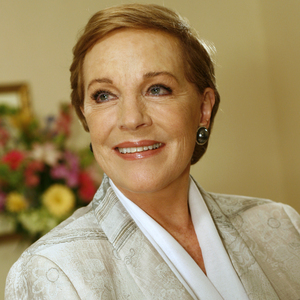

Though her laugh lines coexist with smartly applied makeup, she's still the face that launched some of the world's greatest musicals as long as a half-century ago.
But the most dramatic evidence of her victory against the passage of time is the fact that, at age 72 and against rather unusual odds, Andrews will sing tonight at the Mann Center for the Performing Arts.
The program, titled The Gift of Music, is built around a musical-theater adaptation of her children's book Simeon's Gift. But there's far more anticipation of the Rodgers and Hammerstein portion of the show, when Andrews will join a troupe of young performers in song. Yes, song - years after her singing career seemed to be history, following botched vocal-cord surgery in 1997.
When The Gift of Music (co-commissioned by the Mann Center) was announced this summer for four semi-outdoor venues around the country, Andrews was billed simply as host and narrator. Then, slowly, word filtered around the theater community that she might sing if it felt right.
Might has turned to will.
"I don't sing the way I used to. I can't. There's no way I can do that," she says. "I have some low notes. And they are very low. And I'm grateful for them, believe me. And with this particular show, it's been well thought out and it works. I'm contributing in a nice way to the evening."
It's not her first post-surgery vocalizing. In a late-'90s Tony Awards telecast, she and Carol Burnett casually warbled snatches of songs, a cappella, before announcing nominees. In the 2004 film The Princess Diaries 2: Royal Engagement, Andrews was drafted into some quasi-hip-hop talk/singing. But she's expected to go well beyond that tonight.
Vocal-cord surgery or not, opera stars often don't sing past 60. "I think that with Broadway voices, the muscles are slightly different," she says. "They're not as refined as opera singers'. Probably they can go for a fairly long time. As one gets older, certain highlights disappear.
"But in my case, I don't have the voice I'd love to have - and I'm not dreaming of the early voice."
When discussing her voice (once a four-octave soprano), as she did Tuesday at her Ritz-Carlton Hotel suite, you sense her legendary poise wavering slightly in the face of a deeply emotional issue. Despair over her lost voice, plus the death of a beloved aunt, in 1999 had her checking into a clinic in Tucson, Ariz.
"I've sung my whole life! My identity was that of a singer, and I felt it was taken away," she says. You'd think that her Oscar statue might have reminded her that she's also an actress - but that skill was learned. "Singing was the luxury and the pleasure and the gift that I was given," she says.
One imagines a support group with colleagues such as Liza Minnelli, who had vocal crises around the same time. "We've talked," Andrews says, "not to any vast extent, but we've talked from time to time."
The lost-voice saga began after the grueling Broadway run of Victor/Victoria. It was 1997, and Andrews was treated for a vocal-cord blister that apparently had dogged her since My Fair Lady in the late 1950s. Immediately after the operation, she sensed trouble, and eventually filed a malpractice claim against Scott Kessler that was settled out of court in 2000.
Since then, she has worked with Steven M. Zeitels, a laryngologist (Andrews calls him "a vocal wizard") who founded the Voice Restoration Research Program in Boston.
Much filled the vocal void of the last decade. She spent four years on an autobiography - Home: A Memoir of My Early Years - that's full of insights and wisdom, expressed with cultivated eloquence. She had written a few children's books in the past, but now writes more and has her own publishing company, the Julie Andrews Collection, for which she chooses paper and typefaces.
She writes in collaboration with her daughter, Emma Walton Hamilton, with illustrations by her ex-husband, Tony Walton. One imagines them sitting around the kitchen table plotting the further adventures of Dumpy the Dump Truck - a series that's now up to volume four.
"That's exactly right," she says. "I knew Tony when I was 12 years old. That friendship doesn't go away. We're true friends and always have been."
Promoting those books, Andrews is a road warrior, even going so far as to serve as honorary chair of National Library Week in April. No matter that children's literature takes her back into the Mary Poppins zone that typecast her for years. Such things don't concern her for long, if at all: "I always thought, 'Let's try many many many different things.' "
She did, and still does, more than you might expect at her age. You need not scratch the surface of her memoir very deep to suppose why.
Though the book is full of amusing backstage stories (including some about Rex Harrison's "windy stomach" disrupting My Fair Lady performances), there also are accounts of attempted sexual abuse by her alcoholic stepfather, as well as her mother's descent from credible vaudeville performer to barroom denizen.
Children who grow up amid that kind of domestic instability sometimes never gain a secure sense of home. Indeed, finding home is among the themes in Andrews' book. And as much as she says home exists in Los Angeles with her husband, Blake Edwards, and in Sag Harbor, N.Y., with daughter Emma, you wonder whether she would move around so much were that completely true.
Andrews pauses and ponders.
"I never thought about that," she says of her peripatetic nature. "It is stimulating. I always have to be doing something . . . ."

